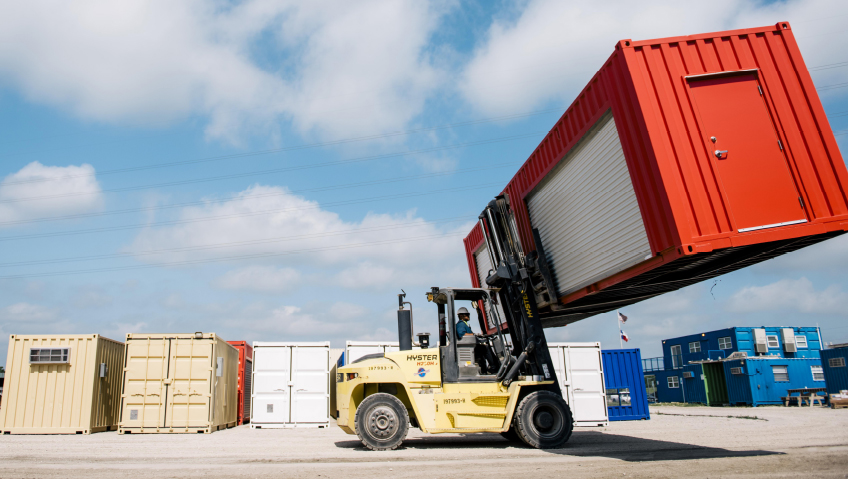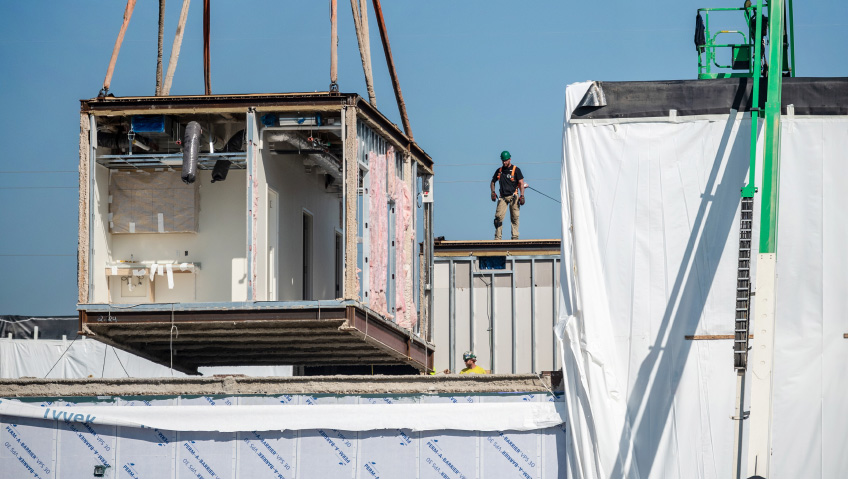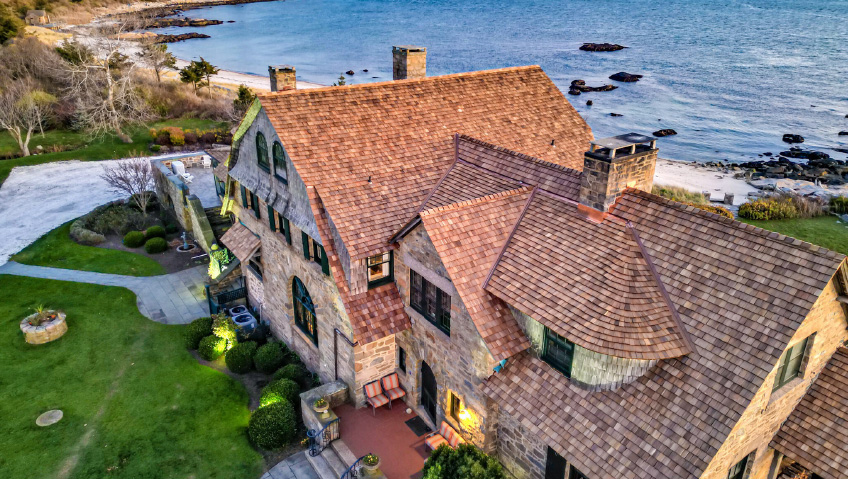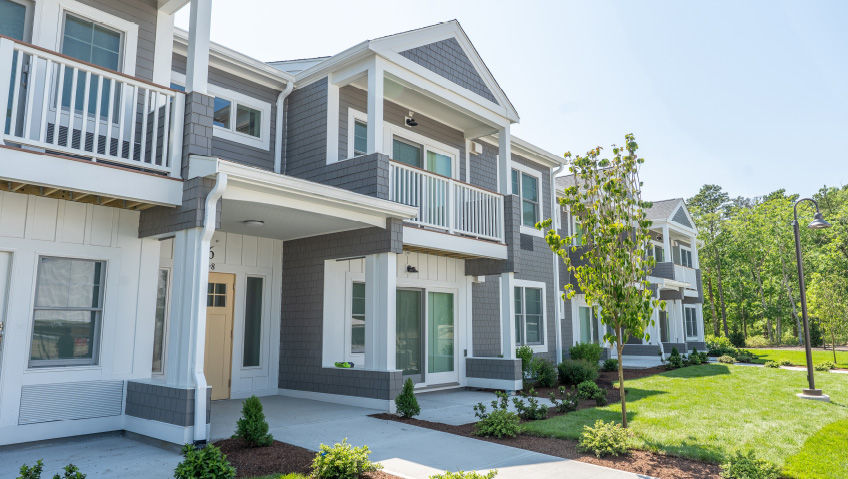Strong, durable, adaptable, transportable, affordable, and quick to produce – what’s not to like about working spaces and living spaces transformed from shipping containers by Texas-based Falcon Structures?
Shipping containers, widely used to transport goods to and from just about every country in the world, are more common nowadays than people at ports worldwide. Made from COR-TEN®, a unique, naturally oxidizing rust-resistant steel, these containers are weldable and extremely robust; in fact, loaded containers locked together can be stacked nine high, a testament to their strength.
However, size and versatility make shipping containers not only ideal for transporting all manner of things but also for providing everything from storage facilities to offices, and industrial spaces to living spaces.
As students at the University of Texas in the early 1990s, Stephen Shang and Brian Dieringer certainly did not have shipping containers and their spatial virtues at the forefront of their minds. Following graduation, the pair stayed in touch but went their own ways, Shang to San Francisco and dot-com gold, and Dieringer to a software company in Austin.
A company you can kick
By the time the dot-com bubble burst in the early 2000s, Shang was disillusioned with the tech industry. Moving back to Texas, he embarked on creating a real business — “something you can see, touch, kick, and feel,” he says.
After investigating other types of low-tech enterprises, including a smoothie company, he came across the portable storage industry. It wasn’t long before the two old friends were together again, fleshing out Shang’s insight into the storage industry with a business strategy – and purchasing containers in Houston.
A novel idea – customer service
Shang, now Chief Executive Officer, and Dieringer, Executive Vice President of Products, sussed out competitors in the mobile storage arena and quickly saw that, while the services were similar to what they had in mind, the approach was different, with many other companies notably lacking in customer service and putting clients through an endless call center loop.
Inspired, the duo built a local company in 2003, consciously setting out to do it better than the competition by focusing on client satisfaction. The initial plan was simple: start a portable storage business, run it for two or three years, sell, then get back into the tech sector. “But there’s something about containers that just gets into your blood,” says Shang of the company, known at the time as Falcon Storage.
To build a customer base, Shang and Dieringer started with cold calls to potential customers from the Yellow Pages, soon applying tech-marketing techniques such as Google pay per click (PPC), followed by building a direct sales team using SalesForce cloud computing and software like HubSpot.
Referring to the fledgling business as “three start-ups in one,” Shang says Falcon started out as portable storage, but quickly began to receive questions about other uses for the containers, such as hunting cabins or portable offices. This led to asking Dieringer’s father – who was in the construction industry – for help.
Soon, the company was renting out offices made from shipping containers on job sites. Within a few years, almost 70 percent of Falcon’s business was in construction. When the recession of 2007-2008 struck, the company saw rented storage containers used by construction companies coming back in droves. Since they had personally guaranteed bank debt to buy the containers, they had to do something, and fast. The solution: discovering a unique niche with the military training industry.
Discovering an industry
“The military was asking us, ‘can you build simulated villages? Simulated schools? Simulated mosques out of storage containers so our troops can train in them?’ And we said, ‘Heck yes, we can!’” says Shang of the second iteration of Falcon – Falcon Containers.
Offering the newly realized capabilities of storage containers stacked together like blocks of LEGO®, company representatives attended trade shows with American colonels and generals, becoming one of the largest providers of military training structures in just four years. “It culminated in us building an entire city out of 700 containers in New Mexico. It was fantastic.”
When funding from the Department of Defense slowed down in 2012, Falcon took the lessons it learned working for the U.S. Military and applied them to the oil and gas sector with well-known businesses like Energy Transfer and Kinder Morgan, educating them about the many benefits of building container-based structures. Then, after selling the rental side of Falcon about five years ago, Falcon created its third iteration – Falcon Structures. The company shifted its focus to building structures for industry out of shipping containers.
With living space becoming more costly, cities are looking for alternative, versatile, and viable solutions. So, for the past five years, Shang and Dieringer have been busy in the background, helping change building codes to allow for creating permanent structures with containers.
“So now we are embarking on our fourth iteration,” says Shang, “and we’re building apartments, offices, and container parks out of containers, which are a permanent modular construction.”
Shaking up the industry
Oil, gas, and other sectors have been using durable container-based structures as temporary homes for workers worldwide. So permanent places to live — complete with plumbing, electrical connections, climate control, and all the other amenities of home — seemed the next logical step for Falcon.
This idea gained public impetus in 2016, when Shang gave a presentation to the Modular Building Institute (MBI), a worldwide non-profit trade association. The problem was that container structures were already being built, but building codes generally needed to be modified to make container developments safe and compliant.
Fortunately, the building code community embraced the issue, and moved quickly. Soon, task forces were created, and Falcon served on International Code Council (ICC) committees to establish new building codes for container-based structures.
“When regulators came for help, we knew the market was here to stay,” says Shang. “Since then, the MBI has asked me to present on the safe use of shipping containers every year. That has been our reputation if you will. We are forging a path with the building code community and working with them on behalf of industry to figure out how to come up with regulations that make sense.” Most recently, Shang gave a virtual presentation at the Institute’s 2021 World of Modular Digital Conference & Tradeshow, held March 8-12.
Although new organizations are appearing on the horizon, Shang believes the Modular Building Institute’s longstanding reputation speaks for itself. Founded in 1983, the MBI’s members include manufacturers, contractors, and dealers “in two distinct segments of the industry.” These include, according to the MBI, “permanent modular construction (PMC) and relocatable buildings (RB),” along with associate members including service companies, financing, and building-component suppliers.
“Because MBI has been around for a long time it has a solid reputation with people inside and outside of the modular industry,” says Shang, commenting on the MBI working with the Associated General Contractors of America (AGC) to develop consensus documents for modular subcontracts.
“One of the things we identified with MBI was that they were very interested in forming a relationship with the International Code Council. The modular industry as a whole was not properly addressed in the building codes. Container-based structures became the platform for MBI to get a seat at the table, show that we wanted to be involved in that conversation, and to really effect change in the building codes,” he shares.
“Had we or any other company done that alone without the support of MBI, it would have taken years. But as an industry, we got that through in a couple of years, which for building codes is incredible. It’s a phenomenal organization.”
Serving on the MBI’s Board of Directors and Co-Chairing the Government Affairs Committee, Shang says that the organization remains alerted nationwide for legislation that may impact the modular industry.
Working with different regulators including the States of California, Texas, and New York, Shang is well placed to explain why modular construction works. “It’s a very productive conversation because of MBI’s reputation,” he says. “They’re not just a trade organization; they are a very strong advocacy organization. Because this industry is growing very fast, it needs that kind of support and leadership.”
Doubling revenue
If, as expected, Falcon’s growth trajectory continues, the company is poised to double its annual revenue in the next three years. The first reason, says Shang, is the fast growing market for shipping container-based structures, with increasing respect for their durability, aesthetics, and functionality.
Another is the historic under-performance of the construction industry, the subject of a recent report from McKinsey & Company, The next normal in construction: How disruption is reshaping the world’s largest ecosystem.
From delays to cost overruns, the industry has seen a “meager productivity growth of one percent annually for the past two decades,” according to McKinsey. Now it has once more been derailed, this time by the COVID-19 pandemic, with many construction projects brought to a halt.
“If you look at every other industry, they’ve moved to manufacturing in a factory. You don’t build a car in your driveway, and you don’t build an iPhone on your coffee table – you actually buy it from a factory,” says Shang. “So why can’t you manufacture a building in a factory-type setting – that is, modular construction? That’s growing leaps and bounds as more contractors and owners become comfortable with that mode of construction and start seeing the benefits. So, I think those two trends coming together provide a lot of the fuel for the growth company.”
From kitchens to stadiums
For Falcon Structures, the uses for shipping containers are practically limitless.
With a team of 78 including sales, marketing, design and engineering, product team, back office, manufacturing and operations personnel, production management, and direct laborers including welders, carpenters, electricians, plumbers, and painters, Falcon handles almost every aspect of container structures in-house.
This not only ensures better quality control but gives customers confidence that Falcon is in control of the overall production process.
Teaming up with general contractors and working together on projects means modified shipping containers can be turned around in as little as six weeks for standard builds, while advanced and custom builds take from eight to thirteen weeks. Permanent modular construction takes as long as the construction project takes.
Operating from its 51-acre facility in Manor, Texas outside Austin, fondly nicknamed “Area 51,” Falcon Structures continues to innovate and rise to face emerging demands, including the recent pandemic.
COVID-19 is tossing countless challenges at health agencies and first responders, including an extreme demand for vital personal protective equipment (PPE). Falcon’s modified shipping containers are playing a key role in keeping PPE safe from the elements, clean, and well-organized.
And with hospitals running out of space, the company’s portable shipping containers are being transformed into mobile immunization clinics. Safe, private, and easy to disinfect, these Mobile Immunization Clinics are designed to improve efficiency “while becoming a valued and versatile structure for many years to come,” according to the company.
A gamechanger
From ready-to-order mobile medical units to office space, portable kitchens and restaurants, developments to support the homeless, multi-family housing, and more, Falcon Structures is changing how we work and live.
“If you think about Falcon and what we do, we are building a better world by pioneering the use of container-based structures,” says Shang. “Being pioneers, out in front and doing things other people haven’t done before attracts a certain kind of customer that wants to do something special, to do something different, to lay the groundwork for the masses that come after us.”






